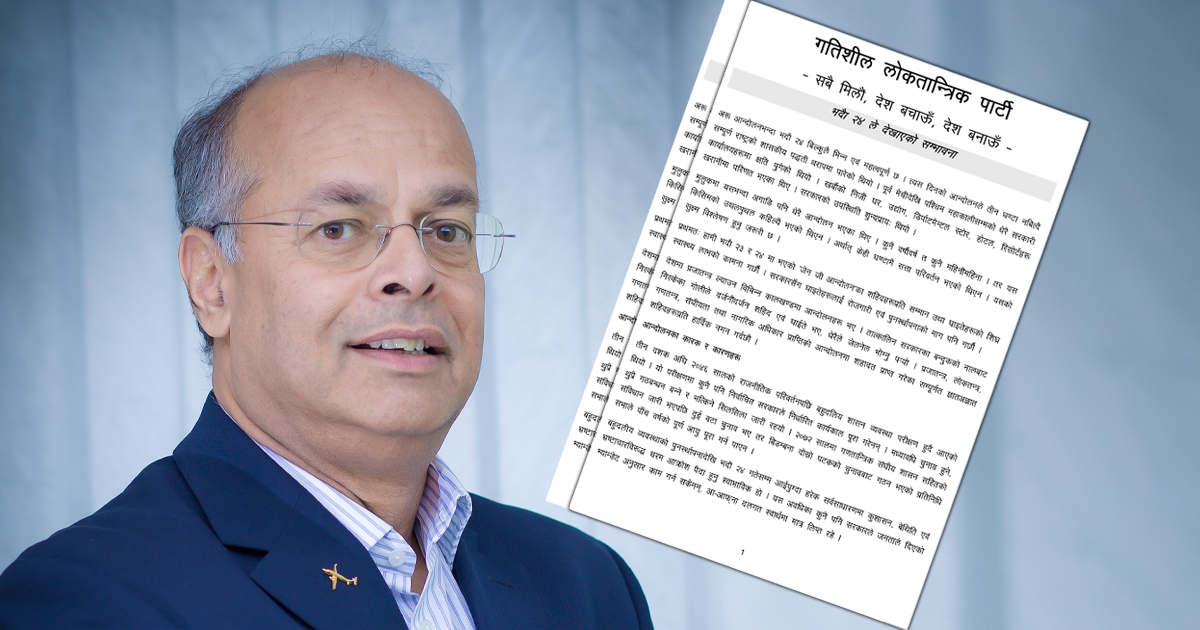Kathmandu: A new political party — Gatishil Loktantrik Party — has been registered at the Election Commission under the leadership of Birendra Bahadur Basnet, the owner of Buddha Air, Nepal’s leading domestic airline.
The party has introduced a two-term limit policy, stipulating that no individual can serve as Prime Minister, minister or hold any public office for more than two terms.
It has also proposed that political parties securing less than 20 percent of the popular vote will not participate in government, a clause aimed at ensuring stable governance and accountability.
According to the party’s constitution, those holding positions in the party’s central or executive committees will not be eligible to occupy public office simultaneously — a move designed to separate political organization from state power.
The party has pledged to promote democratic values, pluralism, transparency and inclusive governance, positioning itself as a reform-oriented alternative to Nepal’s existing political culture.
In its founding document, the party states that employment — particularly sustainable employment — is the fundamental right of every Nepali and the primary duty of the government.
“The core function of the government is to drive development, attract investment, manage the state, and create sustainable employment for citizens,” the statement reads. “Only when every citizen is engaged in productive and creative work can society and the nation progress toward prosperity, peace, and good governance.”
The founders describe themselves as concerned citizens seeking solutions for Nepal’s future. “Entering politics is our duty toward the nation, not a profession,” the document states. “We are here to promote pluralism, harmony, and a culture of diversity in society.”
The party further emphasizes that power is not a means of exploitation, and that it will enforce the principle of “one position, one person” from the very beginning. Even those serving short terms as ministers or prime ministers will not be allowed to hold such positions more than twice. After two terms, individuals must return to normal social life.
To ensure internal democracy and renewal, the Gatishil Loktantrik Party has outlined several key policies:
No member can hold the same position for more than two consecutive terms.
After serving in any party committee for six years, a person cannot hold another committee position.
Party officials and those in public office will be separate individuals.
No one may serve as minister or prime minister more than two times.
All party activities will be monitored through open-source software for transparency.
Candidate selection for future elections will begin from local-level primaries involving broad participation, except for the upcoming election.
The party will maintain a structure of secretaries at provincial and local levels under general secretaries at the federal level, focusing on good governance, entrepreneurship, and equality.
Leadership at all levels will be conscious, hardworking, and inclusive.
The party says this approach will end the culture of politics as a full-time profession and instead create room for new faces and fresh ideas, serving as an institutional legacy for future generations.
The Gatishil Loktantrik Party has announced a strict rejection of patronage-based and dependent politics. It will not have any class-based affiliate organizations, nor will it employ full-time paid political workers.
Moreover, if the party receives less than 20 percent of the national vote, it will not join the government under any circumstances.
The party has pledged complete financial transparency. Its primary source of income will be members, well-wishers, and the general public. All contributions will be deposited through a computerized system.
The details of all financial transactions, donations, and expenditures will be published on the party’s official website.
Annual budgets and spending reports will also be made public, and all accounts will be audited by independent certified auditors on a quarterly and yearly basis, with the financial statements available online for public scrutiny.



Comment Here